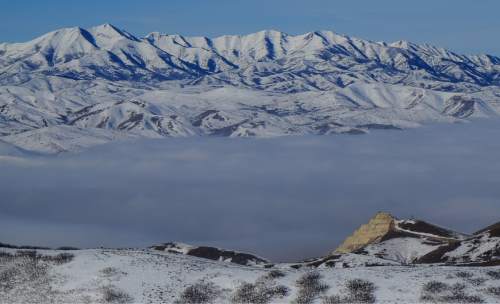This is an archived article that was published on sltrib.com in 2016, and information in the article may be outdated. It is provided only for personal research purposes and may not be reprinted.
The Air Quality Board's contested rule for regulating emissions from water heaters found support among lawmakers during a Wednesday committee hearing.
HB250, which would limit the sale of water heaters in Utah to models that qualify as ultra-low-NOx emitters, obtained a favorable recommendation from the House Natural Resources, Agriculture and Environment Committee with a vote of 9-3.
Nitrogen oxide —NOx — is a precursor chemical that contributes to both fine-particulate pollution in the winter and ozone formation in the summer.
Bill sponsor Edward Redd, R-Logan, testified that HB250 is necessary to fill a gap that would be left by another proposal, HB316. That bill primarily concerns the state building code and would require the installation of low-NOx water heaters in new construction. That provision, Redd said, would capture only 20 percent of water heaters installed in the state. The other 80 percent, he said, are purchased directly by homeowners.
Redd testified that replacing the state's water heaters with low-NOx models would remove as much nitrogen oxide from the state's air as would shutting down refineries.
Members of the committee questioned whether it would be enough to limit the bill's applicability to the areas of the state that fail to meet the Environmental Protection Agency's standards for air quality.
But the entire state would benefit from low-NOx water heaters, said Bryce Bird, director of the state Division of Air Quality, particularly in light of the EPA's new ozone standards, which most populated areas of the state will struggle to meet.
"About an hour ago I was in a nice warm shower at home, and then I got in my single-occupant vehicle and drove here," he said. "There are drastic things we could do to solve the problem … but when we find opportunities to improve air quality and provide the same goods and services, we can't ignore those opportunities."
Lawmakers cited personal reasons to support the bill.
"My wife has asthma," said Rep. Joel Briscoe, D-Salt Lake City. "Two weeks ago she was really struggling."
Briscoe said his daughter, who has not been diagnosed with asthma, also appeared to have two asthma attacks during the inversion earlier this month.
A representative of the Utah Homebuilders Association also spoke in favor of the bill, which he said would make use of the proper procedures. The association had opposed the Air Quality Board's original rule on the grounds that state code was unclear whether the board actually had the authority to regulate building materials and components. Their opposition resulted in a legislative committee placing the rule on a sunset list prior to the session.
Representatives Melvin Brown, R-Coalville; Michael Noel, R-Kanab; and Douglas Sagers, R-Tooele, voted against the bill.
Twitter: @EmaPen



